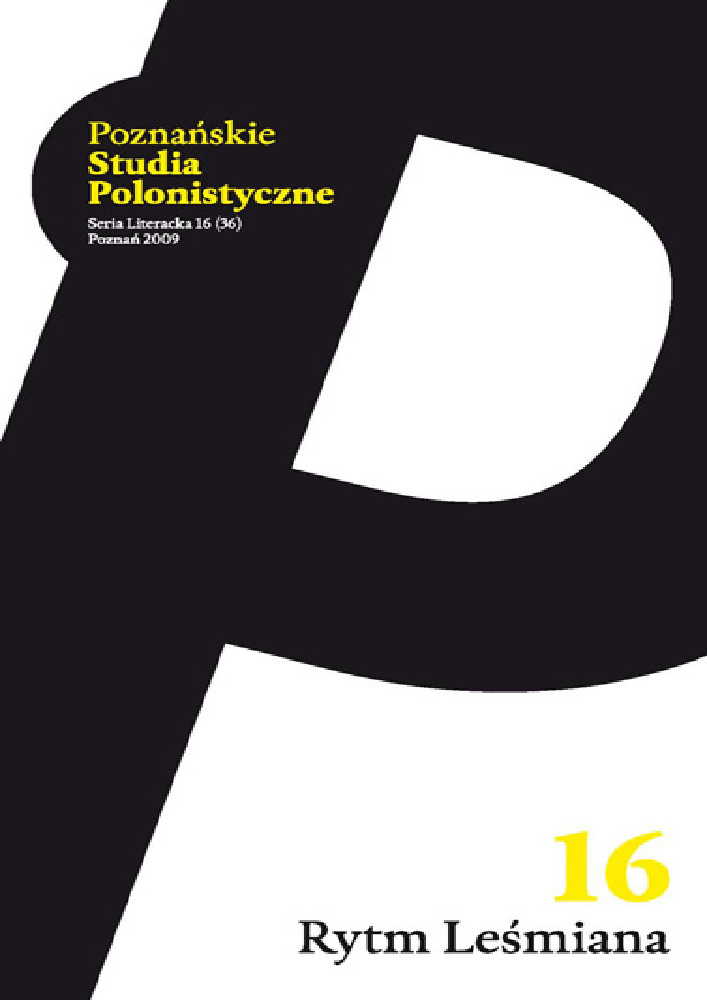Abstract
The poem Do Jeruszalaim combines different original poetical solutions
applied in the collection of poems Odczytanie popiołów and remembering
the experience of Shoah. The language of the poem becomes a tool
employed in a “smuggling” of unsaved Jews, being done “belatedly”,
into the world of the living. Complicated, unspectacular by design,
constructional operations are finely tuned with the semantics of the escape
(flight) and are to lay a false trail, to rescue a human being in the
intricacies of the poem, somewhere between the sheer physics of the
escape and the possibilities offered by words. A particularly interesting
place is given to the phraseological units used in the poems such as
“a handful of pies in the sky” that simultaneously recall futility of the
action but somehow suggest a “smuggling” the act of life-giving activity.
The activities carried out in the language of the poem function
in a ceaseless (and self-augmenting) strain between the two contradictions.
They are: the imperative of memory, impractical (and unfeasible)
act of saving human “after-being” and the protest against the abyssmal
nothingness of Shoah on the one hand, and irony of the futility of these
“vindications from non-existence” as being only verbal, on the other.
References
Czyżewski K., Po drugiej stronie muru. Jerzego Ficowskiego droga do odczytania
popiołów — na 80-lecie Poety, „Tygodnik Powszechny” 2004, nr 36.
Głowacka D., Wsłuchując się w ciszę. Estetyka pamięci o Zagładzie według Jean-François
Lyotarda, „Teksty Drugie” 2007, nr 1/2.
Głowacka D., Znikające ślady. Emmanuel Lévinas, literackie świadectwo Idy Fink i sztuka Holokaustu, „Literatura na Świecie” 2004, nr 1/2.
Głowiński M., Wprowadzenie, w: idem, Stosowność i forma. Jak opowiadać
o Zagładzie?, Kraków 2005.
Kopciński J., Gramatyka i mistyka. Wprowadzenie w teatralną osobność Mirona Białoszewskiego, Warszawa 1997.
Próchniak P., Krynicki: rana istnienia (notatki), w: Słowa? Tchnienia? O poezji Ryszarda Krynickiego, Poznań 2009.
Rosenfeld A., Podwójna śmierć. Rozważania o literaturze Holocaustu, przeł. B. Krawcewicz, Warszawa 2003.
Sommer P., Przewroty słów, zawroty czasu. Notatki o poezji Jerzego Ficowskiego, w: idem, Po stykach, Gdańsk 2005.
Śliwiński P., Wielki powrót, „Nowe Książki” 2002, nr 10.
Ubertowska A., Świadectwo — trauma — głos. Literackie reprezentacje Holokaustu, Kraków 2007.
Vincenz S., Bałaguły, w: idem, Tematy żydowskie, Londyn 1977, cyt. za:
http://univ.gda.pl/~literat/tematy/0014.htm.
Vincenz S., Po stronie dialogu, t. 2, Warszawa 1983.
Zaleski M., Jedyna instancja, w: idem, Echa idylli w literaturze polskiej doby nowoczesności
i późnej nowoczesności, Kraków 2007.
Zaleski M., W mateczniku poezji, w: idem, Echa idylli w literaturze polskiej doby nowoczesności i późnej nowoczesności, Kraków 2007.
License
Authors
Authors of texts accepted for publication in „Poznańskie Studia Polonistyczne. Seria Literacka” are required to complete, sign and return to the editor's office the Agreement for granting a royalty-free license to works with a commitment to grant a CC sub-license.
Under the agreement, the authors of texts published in „Poznańskie Studia Polonistyczne. Seria Literacka” grant the Adam Mickiewicz University in Poznań a non-exclusive, royalty-free license and authorize the use of Attribution-NoDerivatives 4.0 International (CC BY-ND 4.0)Creative Commons sub-license.
The authors retain the right to continue the free disposal of the work.
Users
Interested Internet users are entitled to use works published in „Poznańskie Studia Polonistyczne. Seria Literacka” since 2016, for non-commercial purposes only, under the following conditions:
- attribution - obligation to provide, together with the distributed work, information about the authorship, title, source (link to the original work, DOI) and the license itself.
- no derivatives - the work must be preserved in its original form, without the author's consent it is not possible to distribute the modified work, such as translations, publications, etc.
Copyrights are reserved for all texts published before 2016.
Miscellaneous
Adam Mickiewicz University in Poznań retains the right to magazines as a whole (layout, graphic form, title, cover design, logo etc.).
